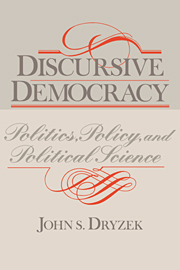5 - International Discursive Designs
from II - Political Institutions
Published online by Cambridge University Press: 12 October 2018
Summary
The International Condition
The absence of any overarching state or state analogue in the international polity is a decidedly mixed blessing. As suggested in the previous chapter, this absence is indeed one less obstacle to discursive democracy. But the concomitant vacuum in central authority has always meant endemic conflict. It hardly need be said that such conflict can be terribly destructive and that the very annihilation of humankind has become one possible outcome.
The chronic pathos of the international anarchy results from largely autonomous actors (nation states and others) pursuing their particular ends in an uncontrolled environment. As Ashley (1980, pp. 205-6) notes, this condition is truly tragic, for it can only be made worse to the extent actors are aware of its dynamics but nevertheless continue to pursue their interests in instrumentally rational fashion. A Henry Kissinger may be smart and aware, but he does not help. In this sense, international affairs are even more poignant than classical Greek tragedies, where at least the audience is allowed to see through the misconceptions of the actors and imagine a better outcome.
The fact that international tragedies result from a combination of instrumental action and a lack of central authority suggests two general kinds of solution. The most popular advocates strengthened authority at the system level, perhaps even some kind of world government (see, e.g., Mendlovitz, 1975; Soroos, 1977). The trouble is that any such solution would reproduce on a grand scale the instrumental rationalization and other nefarious effects of expanding national states and bureaucracies. Centrally administered systems of this sort are also extremely clumsy when it comes to dealing with complexity, uncertainty, variability, and value conflict (see Chapters 2 and 3). Such conditions are ubiquitous when it comes to international security, economic, and ecological problems.
An alternative solution would change not the decentralization of the international polity but the instrumental rationality pervading it. Now, instrumentally rational action in an essentially anarchic system is not unambiguously destructive. As Axelrod (1984) and Taylor (1987) demonstrate, tit-for-tat strategies on the part of instrumentally rational, self-interested actors can secure a large measure of cooperation without central authority. Keohane (1986) applies this argument about reciprocity to the international system.
- Type
- Chapter
- Information
- Discursive DemocracyPolitics, Policy, and Political Science, pp. 90 - 108Publisher: Cambridge University PressPrint publication year: 1990



